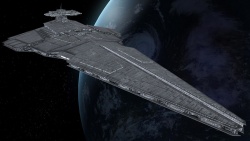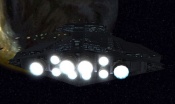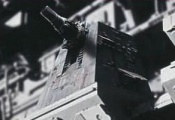|
|
| Line 64: |
Line 64: |
| [[file:cot_construction.jpg|thumb|175px|left|The ''Justice'' under construction at Xa Fel.]]In 25 ABY, acting covertly through a [[starwars:Corporate Sector|Corporate Sector]] shell company, elements of the Brotherhood began to negotiate with KDY to construct warships to expand the Brotherhood’s naval forces. In parallel, negotiations were also opened with SFS in order to secure starfighters and preferred trade status for the procurement of starship components for the new capital vessels to be constructed by KDY. It was during these negotiations with Sienar that several capital starship designs were discovered within the Sienar archives. Two of these design plans, the first being the [[starwars:Praetor-class|''Praetor''-class]] Star Battlecruiser and the other Model 299, were secured by the Brotherhood as part of their arms deals with Sienar. | | [[file:cot_construction.jpg|thumb|175px|left|The ''Justice'' under construction at Xa Fel.]]In 25 ABY, acting covertly through a [[starwars:Corporate Sector|Corporate Sector]] shell company, elements of the Brotherhood began to negotiate with KDY to construct warships to expand the Brotherhood’s naval forces. In parallel, negotiations were also opened with SFS in order to secure starfighters and preferred trade status for the procurement of starship components for the new capital vessels to be constructed by KDY. It was during these negotiations with Sienar that several capital starship designs were discovered within the Sienar archives. Two of these design plans, the first being the [[starwars:Praetor-class|''Praetor''-class]] Star Battlecruiser and the other Model 299, were secured by the Brotherhood as part of their arms deals with Sienar. |
|
| |
|
| While the Praetor design was reworked almost from the ground up to become the [[Brotherhood-class Super Dreadnaught|Brotherhood-class Star Dreadnaught]], the Sienar vessel was nearly perfect for the Brotherhood’s needs already. Following minor design changes to suit the particular needs of the [[starwars:Dark Jedi|Dark Jedi]], the designs were forwarded on to KDY for construction at their [[starwars:Xa Fel|Xa Fel]] facility. The initial construction contract called for two vessels, the [[CSD Cotelin|''Cotelin'']] as the class leader and the [[CSD Justice|''Justice'']]. | | While the Praetor design was reworked almost from the ground up to become the [[Brotherhood-class Star Dreadnaught|Brotherhood-class Star Dreadnaught]], the Sienar vessel was nearly perfect for the Brotherhood’s needs already. Following minor design changes to suit the particular needs of the [[starwars:Dark Jedi|Dark Jedi]], the designs were forwarded on to KDY for construction at their [[starwars:Xa Fel|Xa Fel]] facility. The initial construction contract called for two vessels, the [[CSD Cotelin|''Cotelin'']] as the class leader and the [[CSD Justice|''Justice'']]. |
|
| |
|
| Following the completion of the two vessels along with the other Brotherhood starships, the fleet was transferred to the [[starwars:Verpine|Verpine]] world of [[starwars:Roche|Roche]]. At that time, [[Grand Master]] [[Sarin]] had secured the services of some of the most talented Verpine technicians to upgrade the many of the technical systems aboard the Brotherhood vessels. These upgrades focused mainly on defensive systems and included sensor upgrades and ion shielding. | | Following the completion of the two vessels along with the other Brotherhood starships, the fleet was transferred to the [[starwars:Verpine|Verpine]] world of [[starwars:Roche|Roche]]. At that time, [[Grand Master]] [[Sarin]] had secured the services of some of the most talented Verpine technicians to upgrade the many of the technical systems aboard the Brotherhood vessels. These upgrades focused mainly on defensive systems and included sensor upgrades and ion shielding. |
|
| |
|
| [[Category:Starship classes]] | | [[Category:Starship classes]] |

|
| Cotelin-class Star Destoyer
|
|
|
|
Star Destroyer
|
|
Cotelin-class
|
|
~197,564,000 credits
|
|
1,300 meters
|
- Class One
- Backup: Class Twelve
|
|
Verpine Navigator SPS
|
- Heavy turboasers (48: 14 fore, 14 aft, 10 port, 10 starboard)
- Turbolasers (48: 14 fore, 14 aft, 10 port, 10 starboard)
- Ion cannons (25: 9 fore, 6 aft, 5 port, 5 starboard)
- Assault concussion missile tubes (10, turreted)
- Tractor Beam projectors (8: 3 fore, 2 port, 2 starboard, 1 aft)
|
|
|
|
|
|
2,200
|
|
2,000 troops
|
|
20,000 metric tons
|
|
Eight months
|
|
|
|
Dark Jedi Brotherhood Era
|
|
Dark Jedi Brotherhood
|
The Cotelin-class Star Destroyer is one of the five classes of warships gained by the Dark Brotherhood through Operation Tempest Bravo in 27 ABY. One of the premier force projection tools in the arsenal of the Dark Brotherhood, the class is designed primarily for ship to ship combat, and carries a fearsome array of weapons and starfighters. A truly unique vessel, the Cotelin is one of the only capital ships in the Brotherhood’s fleet that is not based upon a previously deployed starship design. It instead has its origin as an unproduced Star Destroyer design originating from Sienar Fleet Systems.
Characteristics
Dimensions
 Cotelin-class aft.
Cotelin-class aft.The Cotelin-class destroyer is built on a 1,300 meter long hull that is reminiscent of the smaller Sinear-designed Vindicator-class heavy cruiser. It shares the standard configuration of earlier Kuat Drive Yards destroyers with an arrowhead shaped hull with the command tower located aft. A large central hanger deck is located amidships on the ventral surface of the hull at the midway point between the bow and stern. The hull is far thinner top to bottom then many other designs such as the Victory or Republic classes, giving the vessel a smaller profile.
The class also used a multi-reactor design unlike the Imperial-class to improve reliability, and as such did not possess the telltale reactor bulge common with other Star Destroyer designs. Instead, the aft ventral hull surface has a larger, built up superstructure that greatly mirrors the dorsal surface without the command tower. These reactors primarily serve the drive systems located at the ship’s stern, four primary engines and six supplementary drives.
Crew Requirements
Like many of the other modern Star Destroyer designs, the Cotelin-class has far lower crew requirements then previous vessels. While only slightly smaller then the Imperial-class destroyer design, the Cotelin requires a fraction of the crew when compared to the larger destroyer. This was achieved through high levels of automation and efficiency, with many of the ship’s physical systems operated mechanically as opposed to by manual crew interaction. The design does, however, call for a larger gunnery crew then other comparable vessels as the designers felt that more sentient interaction with gunnery systems would offer performance at a higher level then more automated systems.
Offensive and Defensive Systems
 A typical Cotelin ion cannon turret.
A typical Cotelin ion cannon turret.The Cotelin-class carries a main armament numerically smaller then her Nebula-class contemporary, but her single heavy turbolaser systems are capable of power output higher then the dual turbolaser mounts on the Nebula. This gives her an edge in destructive ability with her turbolaser systems, while the single gun mountings allow for the Cotelin to engage a larger number of targets simultaneously. In addition, the class carries a larger number of ion cannons and missile batteries.
Equipped with powerful shields, the Cotelin-class does lack the heaviest armor traditionally found on Imperial-class vessels. The design of the vessel was focused around being a strike vessel that could engage and quickly neutralize opposition and then swiftly disengage from combat. As such, in an effort to improve her sublight speed and handling characteristics, Sienar opted to use a lighter armor plating. The armor of the Cotelin is sufficient to defend against mid-sized cruisers and even other Star Destroyer class vessels in quick engagements; however, performance degrades in lengthy combat. As a result, the Cotelin is less suited to prolonged, short range engagements against massed fire.
In an effort to improve firepower in her forward arc to better fit her strike role, the designers of the Cotelin-class placed the majority of her flank weapons along the port and starboard edges of the vessel. This allows the flank batteries to engage targets directly forward, meaning that in head-on passes the Cotelin can bring over two thirds of her weapons to bear on an enemy target.
Complement
The Cotelin-class was designed to still be able to field a full Imperial style starfighter wing of 72 starfighters while fielding larger, New Republic style designs such as the X-wing or K-wing. This led to starfighter hangar facilities that are larger and more extensive then those found on Imperial-class vessels, which in turn left far less space for ground troops and vehicles. Given the vessel’s role focusing on space combat, the design team felt that this was a more than acceptable trade off. To maximize fighter space, the large internal hangars were divided into separate vertical levels, each able to service and launch fighters to space.
The vessel also carries a complement of 2,000 troops and their support vehicles. The Cotelin is, however, unable to deploy full armored units as her internal capacity and transport craft accommodations are unsuited for such. The vessel can be modified to carry larger ground equipment at the expense of starfighter capacity.
History
Design Origin
The design that would eventually become the Cotelin-class Star Destroyer began life as Sienar Fleet Systems Model 299, developed in response to a request for proposal issued by the New Republic as part of its New Class Modernization Program. The requirements called for a vessel to serve primarily as a space control platform and to engage enemy vessels in combat. Unlike previous Imperial requirements, the need for comprehensive ground assault and planetary bombardment support were not part of the mission profile for the new design. Sienar had long desired to break Kuat Drive Yard’s stranglehold on capital starship production and felt that this design requirement was their best chance.
While both SFS and KDY submitted proposals for the contract, the upstart Republic Engineering Corporation would eventually win out. Their success with the Sacheen-class light escort had convinced the New Republic government to allow them to handle the lion’s share of the engineering aspects of the New Class program. While KDY still profited by securing position as a licenced constructor of the new classes, SFS was left without any involvement. As a result, the Model 299 design team and plans were shelved.
Construction
 The Justice under construction at Xa Fel.
The Justice under construction at Xa Fel.In 25 ABY, acting covertly through a Corporate Sector shell company, elements of the Brotherhood began to negotiate with KDY to construct warships to expand the Brotherhood’s naval forces. In parallel, negotiations were also opened with SFS in order to secure starfighters and preferred trade status for the procurement of starship components for the new capital vessels to be constructed by KDY. It was during these negotiations with Sienar that several capital starship designs were discovered within the Sienar archives. Two of these design plans, the first being the Praetor-class Star Battlecruiser and the other Model 299, were secured by the Brotherhood as part of their arms deals with Sienar.
While the Praetor design was reworked almost from the ground up to become the Brotherhood-class Star Dreadnaught, the Sienar vessel was nearly perfect for the Brotherhood’s needs already. Following minor design changes to suit the particular needs of the Dark Jedi, the designs were forwarded on to KDY for construction at their Xa Fel facility. The initial construction contract called for two vessels, the Cotelin as the class leader and the Justice.
Following the completion of the two vessels along with the other Brotherhood starships, the fleet was transferred to the Verpine world of Roche. At that time, Grand Master Sarin had secured the services of some of the most talented Verpine technicians to upgrade the many of the technical systems aboard the Brotherhood vessels. These upgrades focused mainly on defensive systems and included sensor upgrades and ion shielding.